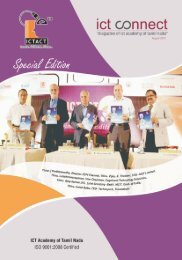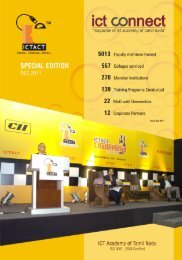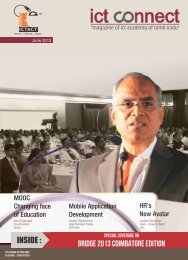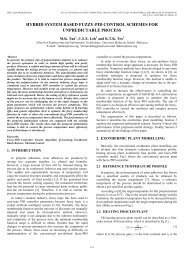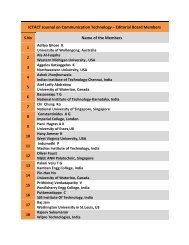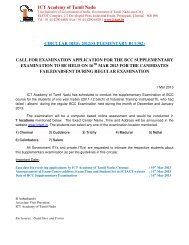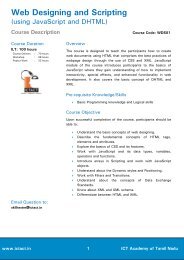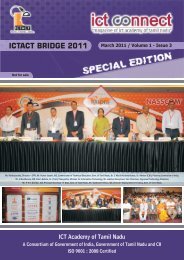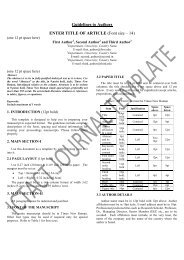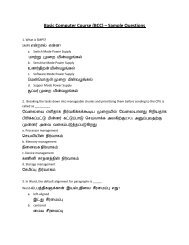Issue 1 - ICTACT.IN
Issue 1 - ICTACT.IN
Issue 1 - ICTACT.IN
Create successful ePaper yourself
Turn your PDF publications into a flip-book with our unique Google optimized e-Paper software.
Language & Communication Skills<br />
Nikhil Indrasenan<br />
Business Head – Ma Foi Academy<br />
Why is it difficult to talk with some people and so<br />
easy to talk with others Is communication a skill or an<br />
art Whatever be the type, communication is a<br />
competency every professional has no choice but to<br />
master. To be a good communicator, do we need to have<br />
sound social skills or will language proficiency suffice<br />
Well, both are important.<br />
The four aspects of communication: reading,<br />
listening, speaking and writing are equally essential and<br />
important. In addition to these four dimensions of<br />
language, body language is also a vital aspect. Conversely<br />
body language is known as nonverbal communication.<br />
Almost all job interviews are based on communication<br />
and language competencies. A good presenter can make<br />
an impression, a very positive one at that, even if he/she<br />
does not demonstrate relevant domain knowledge. I have<br />
heard employers state that role-based skills can be<br />
developed but not language skills.<br />
`Give me a candidate who can articulate well and<br />
write with clarity; we can train him in work skills’. With<br />
communication getting briefer and quicker in this age of<br />
speed, written communication, being the most popular<br />
mode of business interaction, needs to be faultless.<br />
Written English requires more care than spoken English.<br />
Usage of simple and plain words instead of fancy phrases,<br />
and short and concise sentences is a pre-requisite of the<br />
global communication work culture. Brevity does not<br />
imply brusqueness or abruptness. On the one hand, we<br />
have to dispense with redundancy in words – we do not<br />
say `endeavour to ascertain and accomplish’; we just say<br />
`try to find out and complete’. Jargon, trendy<br />
buzzwords, sms-ese, acronyms are all, if featured in<br />
written communication, read with impatience and<br />
irritation! Mark Twain said, `I never use a word like<br />
communication needs to be effective and impacting<br />
getting the expected response to achieve results. Spoken<br />
language is critical too, as it involves self confidence, non<br />
verbal skills, active listening, expression and a good<br />
vocabulary. More important, spoken communication<br />
warrants earnestness, without which, the speaker can<br />
sound shallow and pretentious. Spoken language is a habit<br />
and needs to be cultivated consciously. If picked up and<br />
practiced the wrong way, correction and unlearning takes<br />
10<br />
magazine<br />
a long time. The reason why people think they can get<br />
away with improper and incomplete verbal<br />
communication is because the in-person interaction has<br />
other aspects like body signs, expression, gestures,<br />
interruptions, prompting from listener, and so on. While<br />
all these are important for communication, the verbal<br />
skills remain the primary focus. Many errors and gaps<br />
occur in verbal communication. Verbal or speech tics are<br />
those words which are habitually used by the speaker. Do<br />
you recall your student days, when you noted down the<br />
number of times your teacher uttered – you know, do you<br />
understand, okay<br />
Most of us are not aware of our speech tics and we<br />
regularly use them to start a conversation, fill in the gap<br />
and at times, as mere expressions. One of my colleagues<br />
asked another colleague - so, basically, how are you doing<br />
My other colleague replied - thank you, I am naturally<br />
doing well; but, fundamentally you should not be asking<br />
me this, because you see me every day! Verbal tics can<br />
cause not only annoyance but also fatigue to the listener.<br />
The best way to get rid of this habit is to choose someone<br />
who interacts with you closely and have that person give<br />
you instant feedback. Like I said, unlearning or breaking a<br />
long standing habit takes a while, but in due course of time,<br />
with conscious effort, you will have achieved the desired<br />
results. There are other conversational irritants such as the<br />
hemming and hawing; in other words, hesitation and<br />
fumbling in speech. The new age of speed and quickness<br />
has no room for classic meeting addresses such as this: er…<br />
I attended, hmmm, a meeting with the VP, yes, the VP.<br />
Okay And, and I thought hummm I should share what,<br />
uhh what we discussed, so that………. The group members<br />
by that time would have exchanged a few phone messages,<br />
maybe made couple of quick calls and sent out some<br />
emails. And, can we blame them Clarity, articulation,<br />
pace, choice of vocabulary, assertiveness and confidence<br />
are the components that make verbal communication<br />
highly effective and impactful.<br />
A good communicator is a preferred business leader.<br />
Nikhil Indrasenan possesses over 18 yrs of<br />
entrepreneurial and HR experience in recruitment,<br />
consulting & training. He has managed and delivered on<br />
assignments across multiple industries / locations and found<br />
career opportunities for over 5,000 professionals in his tenure.<br />
He currently holds a dual responsibility of Head - Ma Foi<br />
Randstad Academy and Country Manager and Director of<br />
Ma Foi Randstad Sri Lanka.<br />
ICT CONNECT MAGAZ<strong>IN</strong>E



